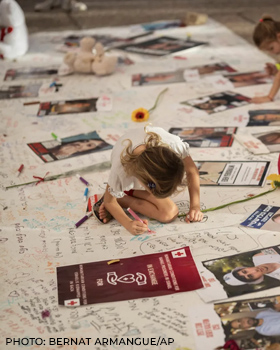Mar 18, 2024
A National Trauma: Mental Health After 10/7

The Israeli National Council for the Child recently recognized more than 19,000 children as victims of terrorism since October 7, including approximately 7,200 age five years or younger. At the same time, psychologists estimate that there are likely 60,000 new cases of PTSD among Israelis resulting from the Israel-Hamas war. The country is in the throes of a national trauma and there is a critical need for rapid and broad mental health treatments and interventions.
Adding to the needs is the fact that the Israeli mental health system was understaffed and underfunded before this crisis. On the eve of October 7, 29 percent of the country's educational psychologist positions were unfilled. In the south, the situation was even more grave, with 36 percent of these positions left unfilled. “We are facing a mental health tsunami because there’s such a big increase in mental health needs, and the Israeli mental health system was neglected for so many years,” said Inbal Brenner, a psychiatrist at Lev Hasharon Mental Health Center.
Through donations to the Annual Greater Miami Jewish Federation/UJA Campaign and the Israel Emergency Fund, individuals coping with the gravity of October 7 are receiving support to begin the long healing journey. Organizations like the Israel Trauma Coalition, the Association of Rape Crisis Centers, YadSarah, IsraAid and NATAL are assisting not only the direct victims, their families and friends, but also more than 300,000 soldiers serving in the IDF, first responders, cyber experts exposed to graphic footage, forensic investigators and even survivors of trauma totally unrelated to October 7, who have been triggered by the barbaric violence and terror.
According to leading Israeli trauma researcher Danny Horesh, Israelis are experiencing “compounded trauma,” whereby trauma comes from multiple sources and carriers. “We are a small, densely populated country, so almost everyone knows at least one person who has been harmed by the war in some way,” said Horesh. “That combination makes it very difficult to cope with reality. There has been nothing like it in the world, not even in our history as a country with such population density.”
The psychological damage on evacuees from the south is exacerbated by their incredible loss — loved ones, homes, jobs, possessions, a sense of security and, in many cases, hope. In addition, survivor’s guilt among members of the southern kibbutzim and attendees of the Tribe of Nova music festival is widespread. In some cases, entire families and groups of friends were slain except for one lone survivor. Many still face anxiety and feelings of helplessness.
Israel is working at breakneck speed to support its population, bringing together governmental agencies with multiple nonprofit organizations. Since October 7, numerous hospitals have opened or expanded their mental health services, including Tel Aviv’s Ichilov Hospital, which opened a department to treat trauma and PTSD experienced by civilians and soldiers, and Lev Hasharon’s sexual-trauma clinic, known as the Nova Anchor.
Beyond allocating millions of dollars toward mental health and trauma relief, the Jewish Federations of North America and Birthright Israel joined the Israel Ministry of Health and the Israel Trauma Coalition to establish Second Line. The initiative recruits and deploys licensed mental healthcare professionals to volunteer in Israel or work remotely with individuals, families and local mental healthcare professionals still reeling from the October 7 attacks. To learn more and volunteer with Second Line, click here.







